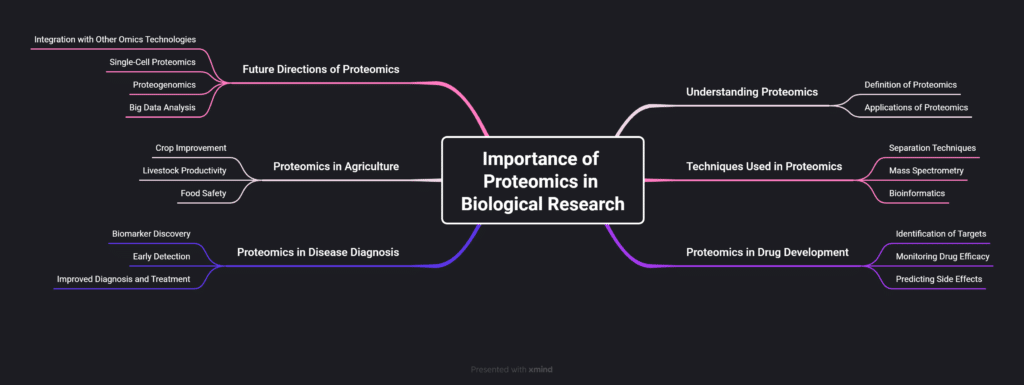Importance of Proteomics in Biological Research
The Fascinating World of Proteomics: Unveiling the Secrets of Proteins
Proteins, the molecular workhorses of life, play a pivotal role in shaping biological processes. Unlocking the mysteries of these intricate molecules has been greatly facilitated by the emergence of proteomics – a field that has revolutionized biological research and propelled us into a new era of discovery. Embark on a journey with us as we delve into the captivating realm of proteomics and explore its significance in today’s scientific landscape.
An Overview of Proteomics: Deciphering the Protein Universe
At its core, proteomics is the extensive study of proteins, encompassing their structures, functions, interactions, and roles within living organisms. This dynamic field employs an array of sophisticated methodologies to unravel the complexities of proteins, shedding light on their functions within the in
tricate web of life.Methods in Proteomics: Unraveling Protein Complexity
The exploration of proteomics entails a multifaceted approach, where a range of techniques collaborates harmoniously. From the initial steps of protein extraction, purification, and separation, to the intricate tasks of identification, quantification, and bioinformatics analysis, proteomics encompasses a wide array of methods that collectively provide a comprehensive view of the protein landscape.
Proteomics in Research: Pioneering Discoveries
The impact of proteomics on biological research is profound, with far-reaching implications across diverse fields. By dissecting the roles of proteins in biological systems, proteomics has spearheaded breakthroughs in areas such as drug discovery, precision medicine, personalized nutrition, and environmental adaptation.
Applications of Proteomics: Illuminating the Pathways
Cancer Research: One of the most impactful applications of proteomics lies in cancer research. By uncovering novel biomarkers, proteomics has elevated our ability to diagnose, prognosticate, and develop targeted therapies for various forms of cancer.
Agricultural Research: In the realm of agriculture, proteomics contributes to enhancing crop yield, quality, and resilience against environmental stresses. The understanding of plant proteins aids in designing strategies to improve agricultural productivity and sustainability.
Neurodegenerative Diseases: Proteomics has shone a light on the enigmatic world of neurodegenerative diseases, unraveling the intricate protein interactions that underlie conditions like Alzheimer’s and Parkinson’s disease. This newfound knowledge opens avenues for potential therapeutic interventions.
Advantages of Proteomics: Empowering Exploration
High Throughput: Proteomics boasts a high-throughput capability, enabling the simultaneous analysis of thousands of proteins. This efficiency surpasses traditional methods and accelerates the pace of discovery.
Post-Translational Modifications: Proteomics excels at identifying post-translational modifications – chemical alterations that can dramatically influence a protein’s function. This insight is critical for understanding the nuanced intricacies of protein behavior.
Quantification of Protein Abundance: The ability to quantify protein abundance under various conditions grants researchers insights into dynamic biological processes, fostering a deeper comprehension of cellular responses.
Proteomics Techniques and Technologies: Unveiling the Tools
Mass Spectrometry: Mass spectrometry, a cornerstone of proteomics, plays a central role in identifying and quantifying proteins in complex mixtures, enabling in-depth analyses of protein composition.
2D Gel Electrophoresis: This technique separates proteins based on their isoelectric point and molecular weight, offering a snapshot of the protein complement within a sample.
Protein Microarrays: A powerful tool for high-throughput protein interaction studies, protein microarrays allow scientists to explore a multitude of protein interactions simultaneously.
Importance of Proteomics in Biological Research
Proteomics in Drug Development: Shaping Therapeutic Strategies
Target Identification: Proteomics guides drug discovery by identifying potential targets based on their expression patterns and activity levels, enabling the development of more precise therapies.
Drug Screening: Proteomics aids in screening compound libraries, identifying molecules that interact with specific proteins of interest – a critical step in the search for new drugs.
Pharmacodynamic Biomarkers: Through proteomics, pharmacodynamic biomarkers are unveiled, providing insights into drug dosing, efficacy, and toxicity in clinical trials.
Challenges in Proteomics: Navigating Complexity
Dynamic Range: The vast range of protein concentrations in biological samples presents a challenge, as detecting low-abundance proteins amidst high-abundance counterparts requires advanced sensitivity.
Post-Translational Modifications: The intricate landscape of post-translational modifications necessitates sophisticated techniques to decipher their influence on protein function.
Reproducibility: Ensuring consistency and reproducibility in proteomics experiments is paramount, as variations in sample preparation, instrumentation, and data analysis can impact results.
Importance of Proteomics in Biological Research
The Future of Proteomics: Pioneering New Frontiers
Artificial Intelligence: The integration of artificial intelligence enables more efficient data analysis, facilitating the interpretation of large proteomics datasets and prediction of protein behaviors.
Spatial Mapping: Emerging techniques enable the mapping of protein locations within cells and tissues, unraveling spatial intricacies that contribute to protein function.
Single-Cell Analysis: Innovations in proteomics pave the way for single-cell analysis, granting insights into the proteome of individual cells and fueling advancements in developmental biology and disease research.
Diverse Career Opportunities: Shaping the Next Generation
Academic Researcher: Engage in fundamental research to expand our understanding of protein structure and function, driving the frontiers of knowledge.
Industry Scientist: Collaborate with biotech and pharmaceutical companies to develop innovative proteomics-based products and therapies.
Bioinformatician: Employ computational tools to analyze proteomics data, revealing patterns and insights that advance our grasp of protein interactions.
In the grand tapestry of biological research, proteomics emerges as a vivid thread, weaving together intricate details and revealing the stunning complexity of proteins. Through its applications, techniques, and advancements, proteomics has unlocked doors to uncharted territories, igniting the flame of discovery and propelling us into a future where the mysteries of life are unraveled one protein at a time. Join the journey into this fascinating world, where the boundless potential of proteomics continues to shape the way we perceive and understand the intricate machinery of life itself.
If you are eager to take a deep dive into the world of Proteomics – then you are in luck.
🚩🚩🚩🚩🚩🚩🚩🚩
21 Days Exclusive Proteomics Research Internship For Biotech, Chemistry & Pharmacy Students
Supercharge Your Knowledge & Skills in Proteomics Research & Excel in the R&D Industry
Starts From 28th August 2023
Time: 6 PM to 7 PM
🚩🚩🚩🚩Under Watson Impact Scholarship – https://wise.biotecnika.org/
Register Now – Limited Seats
Importance of Proteomics in Biological Research







































